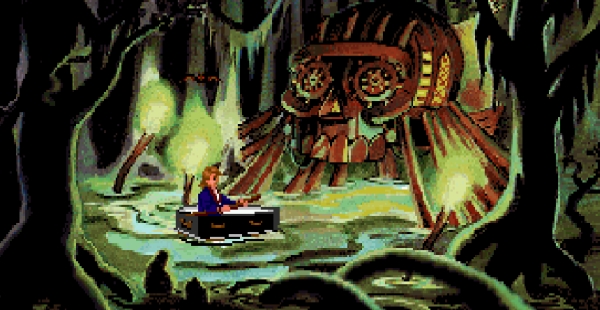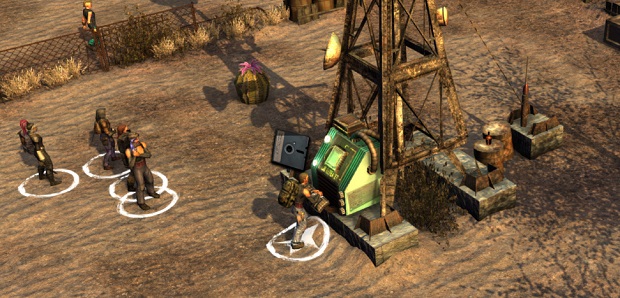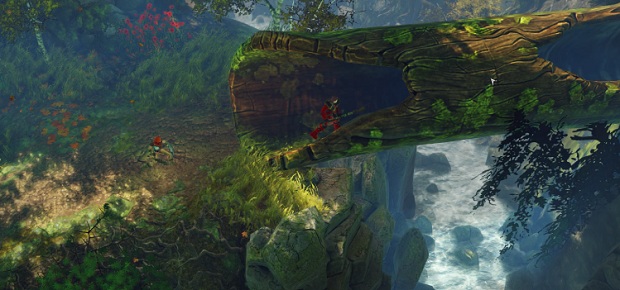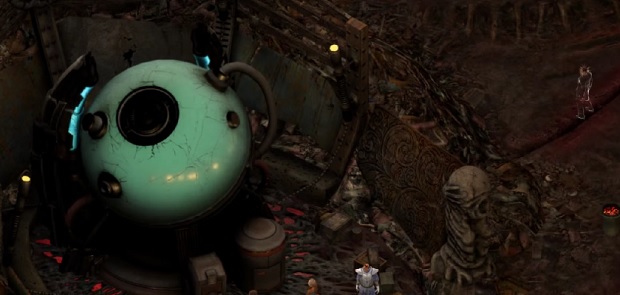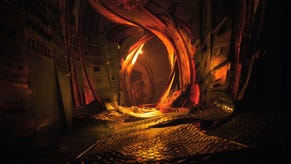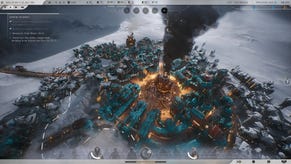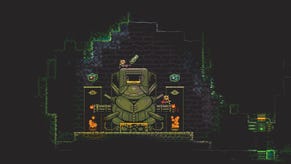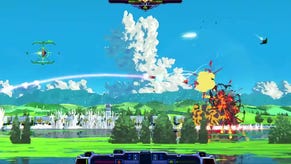The RPG Scrollbars: RPG Vs. Adventure
A Tale Of Two Genres
Last week, I casually mentioned how glad I was that the current RPG revivals have been doing so well - so many old franchises getting a new Kickstart, so many classic styles getting a fresh airing. I also muttered something though, about how sad I felt that adventure games hadn't been so fortunate. Since then, I've been pondering that. Why? Why has one genre done so well, creating games like Divinity: Original Sin and a whole line-up of new games to look forward to, while the other has resulted in largely forgettable stuff like Broken Age instead of new modern classics?
At heart, I think it's down to an ironic change in fortunes over the years. Adventure games are an often misremembered genre, even to many who both make and play them. In particular, what's forgotten is that at release, games like Monkey Island were the equivalent of Hollywood blockbusters, games like Gabriel Knight were trailblazers doing things we'd never seen before, and that until 3D came along and spoiled the party, adventures were the genre for trying out new technology and forging new ground. First 15 and 18 rated games? Adventures. When IBM needed a showpiece for its PCjr, it used King's Quest. King's Quest V was one of the earliest showcases for VGA. "Talkies" were one of the big selling points of CD in the early days. FMV... well, it didn't work out so well in the end, but again, adventures were on the vanguard. On top of all that, adventures were routinely ahead of their time in terms of content, like offering female protagonists as more than just a token character choice long before it began annoying the kind of people who need to be annoyed more often.
You wouldn't know this from most modern adventure games though because... and I'm not speaking about literally all adventures here... they're now largely a cargo-cult genre. By that I mean that far too many simply ape the design of the past without understanding that to make something like Monkey Island isn't a question of making something like Monkey Island. That game broke every mould that the genre had. To name just a few things - creating the Three Trials system that's still the standard design style today, adding real-time puzzles like following the shopkeeper, coming up with dynamic mechanics like the insult-swordfighting system, having a total tonal shift from conventional adventuring to something more RPG like upon arrival on the titular island... I could go on, but you hopefully get my point. The vast majority of adventures that we get aren't even trying for that level of innovation or novelty value, and sure as hell don't have the relative budgets to pull it off. Instead, they're content to be the next Touche, the next Bud Tucker, the next Innocent Until Caught - following along in the wake of Lucasarts and Sierra and a couple of other big names like pilotfish. If we follow them, we'll get to where we need to be. Right? Never mind that nobody gave a shit about those games back in the 90s. Hold the line! Keep the faith! It'll all work out eventually, right?
Wrong. And a big part of that is an unfortunate misunderstanding of why those games did what they did - that the adventure game mechanics of something like Monkey Island are a template to aspire to, rather than simply the best the designers could do at the time. The big draw of adventures at this time wasn't and never was the puzzles, but their ability to draw us into another world that actually worked like one - be it a fantasy world, a living story, a futuristic dystopia or whatever else. The verbs were tools to facilitate our interactions, exciting primarily because nothing else came close.
All of this quickly becomes a big problem for any adventure rooted in nostalgia.
Let's now jump genres for a moment to consider the RPGs of old. With a very few exceptions, notably but not exclusively from Origin, RPGs were at the other end of the scale from adventures - ugly, clunky, obtuse, hard to play games with very little real character outside of the manual, and reliant on scale to both impress and cover up the cracks. They and adventures had a certain amount in common, both wanting to be story-telling genres, but RPGs were masters at hiding away the good stuff. Hell, it's still somewhat notable when a good looking or easy to recommend to everyone example shows up, both from historical factors and the challenge of doing so at such scale.
But in many ways, this proved the genre's biggest advantage over time - that what stuck with players and designers was what it was trying to do. Its soul, if you will. It never felt like a solved problem in the way that adventure games fell into a rut, with every major series being its own quest to tap into that core dream from a very different angle. The world simulation of Ultima. The scope of Daggerfall. The intimacy of Planescape Torment. As time and technology moved on, many of the initial problems began solving themselves. They learned to make interfaces that don't suck. We got the storage space to let conversations be more than "Name? Job? Bye." They managed to become, more or less, the games that we saw in our heads while playing through them back in the day, when a few wiggly lines made the Battle of Helms Deep feel like a playground scuffle - epic adventures that stir the blood and loins, yet without adventures' core problem of having basically One True Design.
And it's no wonder that this has produced better games. If you're a modern adventure developer working in the old-school style, you're basically trying to recreate blockbusters with pocket-money budgets. Modern tools may be endlessly superior to the ones of the day, but expectations are also endlessly higher and the audience's willingness to try new things depressingly lower. RPG developers sure as hell don't have it easy, and I'm not trying to suggest otherwise, but they do at least have an audience willing to consider The Witcher 3, Bard's Tale IV, Numerera, Wasteland 2, Skyrim, Mass Effect 3 and hell, even South Park as equally valid expressions of what the RPG can be and do. (Admittedly, Bioware's not been too popular of late, but still.) The spectrum of what's considered acceptable for a modern game is also far wider, especially in follow-up games. Wasteland 2 isn't exactly the belle of the ball, but hey, it's a hell of a lot prettier than the original, right?
Also useful is the deeper understanding that times change, and aren't always fair. As said, originally verbs in adventure games were empowering - a way of interacting with their worlds on a deeper level than anything else even came close to. As time went on though they became limiting factors. They still arguably work, especially with RPGs rarely letting you look at things or interact much with the world, but they don't feel like they do. Why can't I throw that brick through the window? Why can't I punch that NPC? It's like trying to navigate the world in a straitjacket which only gets tighter with every puzzle that could be solved with £5 and a quick trip to the nearest hardware store.
RPGs meanwhile generally get away with worlds as non-interactive as a museum exhibit because they're not constantly dangling options that they won't follow through with. Why can't I smash down that door with my sword? Because you can't attack scenery. Deal with it. The rare time we actually get to cut the Gordion knot and solve problems using more emergent methods becomes a selling point rather than a point of frustration in the games that don't let us do it, as do moments like being able to headbutt an annoying NPC. Again, it's all part of how modern RPGs turn weaknesses into strengths - the realisation that a few well chosen bits of freedom generally offer the same pleasant dopamine squirt, without risking opening up too many cans of worms. For a moment it looked like The Walking Dead had brought adventures to the same realisation, that limits can actually feel more empowering than freedom, but unfortunately Telltale then apparently realised that it was giving its designers scope to actually do their best work and had them all fitted for a whole new creative straitjacket. Sigh. Not that I'm not enjoying Tales From The Borderlands, but still.
(It's also probably worth noting that the Kickstarted RPGs tend to be from creators who never left the industry and at least the general sphere of RPGs and their culture, whereas most celebrity adventure designers have either been out of the picture for the best part of a decade or working on completely different kinds of games. In interviews, I can also count on about one finger the number of adventure developers who can name a recent adventure they've enjoyed or even played, with the usual response being an awkward "Oh, well, uh, I've been very busy...", in stark contrast to RPG designers who usually can't stop waxing lyrical about their recent D&D game or are fifty hours into a competitor's product. Now, that's anecdotal evidence to be sure, but still... still...)
The result of all this is that while most 'revival' RPGs are indeed rooted on nostalgia for the games of the 80s and 90s, their focus is on recreating the feel we had when playing those games rather than specific experiences that don't hold up. Adventure developers meanwhile typically recreate the form, hoping that it'll be enough. And it just isn't, in the same way that it takes more than sitting in front of a TV with a bowl of cereal to recreate the salad days of watching Saturday morning cartoons anything but ironically. Except for Gargoyles of course, because Gargoyles remains goddamn brilliant. What RPGs can do by polishing up old designs but this time doing them better, adventures have to do by throwing out the rulebook and writing a whole new one - something much riskier, much harder, and above all else, much harder to sell as a dream worth breaking out a credit card to help realise. Especially after so many disappointing attempts so far.
And I don't say that with any satisfaction. Speaking as a long-time fan of adventures, I really hoped that Kickstarter would allow for the designers of old to strut their stuff once more, to progress from nostalgia to modern innovation, and to remind the wider world why we love those often bastard games. Perhaps it still will, though I'm not holding my breath. At least we've seen some big successes worth holding up and praising, not least of them Sam Barlow's Her Story the other week. Love it or hate it, and you won't convince me it wasn't successful, it's at least trying to do something new.
As an equally-long-time fan of RPGs though, I'm relieved that so far, they've had better luck. Saddened that none have been smart enough to add a no-spider mode stretch goal of course... looking at you, Underworld... but still, relieved. There's no genre more poorly served by just sitting on its laurels instead of continuing to try and tap its genre's soul, and each new game is a reminder that however good something like The Witcher 3 may be today, it's still just a shadow of the genre's actual Holy Grail. Chances are we'll never actually see it, but that doesn't matter. It's the quest to get there that counts - the push that gives us both better games, and some amazing paths to turn around and fondly remember walking. Whether or not they actually ended up going in the right direction.


